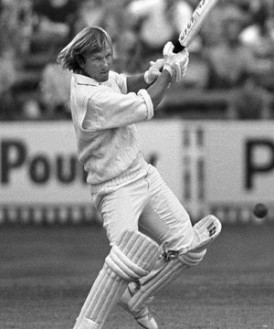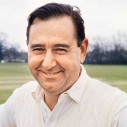How Grizzly Took His Chance
David Taylor |
A curious feature of England’s Test batting records is the number of batsmen who have excellent averages and yet played very few Tests. KS Duleepsinjhi, 12 matches, average 58.52. CAG (the original ‘Jack’) Russell, 10 matches, average 56.87 – with five hundreds! Ernest Tyldesley, 14 matches, average 55.00. And just below them with a mere eight caps but sitting above Boycott, Hendren and Pietersen, sits Clive Thornton Radley – 481 runs, average 48.10, two hundreds.
Yet but for an injury to his county captain, Mike Brearley, in Pakistan at the end of 1977, Radley would probably have never played those eight times. He is something of a forgotten figure today. Many of us can recall the young David Gower, receiving his first ball in Test cricket from the Pakistan left-armer Liaqat Ali and pulling it for an effortless four, few would recall that he was watched by Clive Radley, on his way to an untroubled hundred, at the non-striker’s end. He was one of two batsmen placed on standby for England’s 1977-78 tour of Pakistan and New Zealand, and when Brearley’s arm was broken by a delivery from Sikander Bakht, he was preferred to Warwickshire’s John Whitehouse. Perhaps the outgoing captain had some influence in his Middlesex team-mate getting the nod, but it would hardly have been the first or last time – Graham Gooch’s time as captain saw call-ups for Nasser Hussain and John Childs, while David Gower’s resulted in caps for Jonathan Agnew and Les Taylor.
In his ‘Diary of a Cricket Season’ Bob Willis states that Radley was known as ‘Grizzly’ for his habit of wearing moccasins in the dressing- room – like the TV character Grizzly Adams – but it fitted him anyway; he seemed to us youngsters to be much older than 34. There was nothing very elegant about his crouching stance and he tended to carve and nurdle the ball, but it was mightily effective, and he was a hare between the wickets. Paul Collingwood would perhaps be a close modern comparison. From neighbouring Hertfordshire, he came into the Middlesex team in 1964, having played for Norfolk in his teens. That season he played a handful of matches, batting at seven or eight, making his first-class debut against a Cambridge side captained by Brearley, and failing to reach 50 although his seldom-used leg-breaks took the wicket of Surrey’s Mike Willett at the Oval.
The following season saw his name in the headlines for the first time. The South Africans, making their last tour of England for 29 years, played the county at Lord’s in August and had reduced the home side to 72-5 before Radley, now batting at five, and his skipper Fred Titmus added 227 for the sixth wicket, the younger man making his maiden first-class ton and going on to 138. That partnership would remain a county record until 1994. Despite that breakthrough it was the only time he reached three figures that season, although an average of 34 was encouraging. Wisden noted: “the biggest advance was made by Radley, a batsman who showed plenty of strokes and a good fighting spirit besides being an excellent slip field.”
For the next twelve years Radley was Mr Consistency, generally averaging mid to high thirties, two or three centuries a season, but never making the eye-catching big scores or having the sort of 2000-run season that would have encouraged the England selectors to consider him. But Middlesex’s fortunes were famously revived under Brearley, winning the Championship outright in 1976 for the first time since 1947, and this was no doubt a factor in the captain succeeding Tony Greig in the England job despite being barely established as a Test player himself.
And so, with the help no doubt of a word from his skipper, Radley it was who flew out to Pakistan to reinforce the side now led by Geoff Boycott. He had to wait until the second Test in New Zealand to make his debut though. England had been beaten by New Zealand for the first time in the previous encounter at Wellington, and responded to being bowled out for 64 by strengthening the batting, Radley coming in for Mike Hendrick. Batting somewhat out of position at six he managed only 15, but England won easily and he retained his place for the final game at Auckland. Brian Rose had been dropped and Derek Randall opened the batting with Boycott, with Radley moved up to his regular position at number three. His 158 lasted almost eleven hours, spanned three days and was the bedrock of a total of 429 made in 156 eight-ball overs. John Woodcock writing in the Cricketer wrote: “we have been crying out for an Englishman, other than Boycott, to make a Test hundred, and one should not be carping; but Radley’s was not the sort of innings that wins Test matches.” In fact the match was left drawn after six days, still in its third innings with Geoff Howarth of New Zealand completing two hundreds of his own.
What Woodcock may not have appreciated was that Radley was very much following his captain’s instructions. Speaking to Wisden a year later as one of its Five Cricketers of the Year, he explained: “it was an uncharacteristic innings, as I normally like to keep my score active … during our stand Boycott, the captain, kept reminding me how much longer a Test lasted and to bat accordingly.” One would hardly have expected ‘Fiery’ to offer any other advice.
Back in England a score of 79 in the first one-day international against Pakistan helped to establish his place, and a hundred in the first Test of the summer, at Edgbaston, ensured his spot for the rest of the season; at five hours it was a more attractive innings than his Auckland marathon, although it was overshadowed by a more brutal effort from Botham. He continued to score consistently against the summer’s other tourists, the New Zealanders – curious that England’s visitors should have been the two countries that they toured in the winter – hitting 41 and 117 not out in the two one-day games against the Kiwis. He deserved better than to have his final innings of the series, and the last of his Test career, ended first ball by a Hadlee yorker, incidentally the first day of Test cricket that I saw live. It should be mentioned in passing that he had every reason to be distracted that summer, as he and his wife were expecting their first child.
Radley was a straightforward selection for that winter’s tour of Australia, a side now denuded of most of its best players due to the schism with World Series Cricket, but his tour was a forgettable experience – hit on the head by Rodney Hogg in the first state game, he followed with a series of poor scores and although he made 60 in the return fixture with South Australia, the Test side was settled by then. There would be no more appearances at the highest level but Radley remained in the Middlesex line-up for almost another decade, making his maiden double hundred in 1985 at the age of 42. On retiring two years later he continued for another 20 years as the county’s coach, helping to develop the young Mark Ramprakash among others. His long service to the game was marked with the award of the MBE in 2008.
‘Grizzly’s’ brief time in the spotlight was a classic case of ‘right time, right place’ but like David Steele three years before he grasped his opportunity with both hands. There is something appealing about the late bloomer, the unsung journeyman who suddenly finds himself on the big stage; Radley can justifiably claim that he repaid the faith of the selectors.





He was never the Middlesex coach, but The MCC Head Coach after his retirement.He is currently The Middlesex President.
Comment by GEZZA | 12:00am GMT 23 March 2014
Radley had a remarkable run in Middlesex’s one-day final wins from 1977-86: he was their top scorer in 4 of the 5 games, and won 3 Man-of-the-Match/Gold Awards.
Comment by AndrewB | 12:00am GMT 24 March 2014
Top stuff from DT there.
A player who, to my shame, I hitherto knew next to nothing about. Public service articles ftw!
Comment by BoyBrumby | 12:00am GMT 26 March 2014
Thanks to the commentors for the correction and additional info. It could be argued that he took advantage of a couple of mediocre opponents, but you can only play what’s in front of you – and his domestic record suggests that he’d have done OK against stronger opposition as well.
Comment by stumpski | 12:00am GMT 26 March 2014
If I remember rightly, it was Clive Radley and Brian Rose who contested Bob Woolmer’s spot once Woolmer had defected to WSC. He was a solid compact batsman who, despite first impressions, was pretty good to watch overall.
Comment by watson | 12:00am GMT 26 March 2014